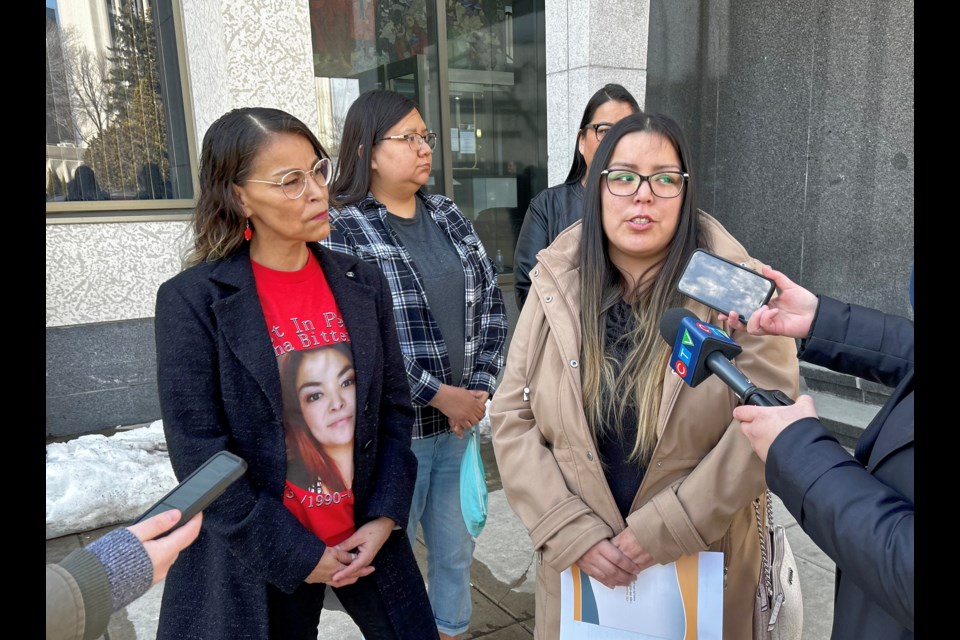REGINA – Dillon Ricky Whitehawk will be spending 25 years in jail.
That was the ruling Justice Janet McMurtry made this morning Regina Court of King’s Bench, with no chance of parole for 25 years. As with his recent sentencing hearing on March 3, Whitehawk, 28, sat emotionless and seemingly unfazed as Justice McMurtry read her decision.
Crown prosecutors were seeking a first-degree murder conviction in the murder of Keesha Cree Bitternose, 29, who was brutally tortured and murdered in a North Central home on Jan. 2, 2020. It would be a further three days before her body was discovered on the 1500 block of Cameron Street.
“On Dec 13, 2022, I found Dillon Whitehawk guilty of second degree murder for his involvement in the death of Keesha Bitternose,” said Justice McMurtry in reading her decision. “I held that I was satisfied beyond a reasonable doubt that Mr. Whithawk had the intent required for murder when he participated in the assault on Ms. Bitternose.”
Previous to Whitehawk’s trial, Kelly Stonechild and Kurt Thomas pleaded guilty to manslaughter (Stonechild was originally charged with first-degree murder) for their involvement in the murder of Bitternose. They received jail sentences of seven and 18 years respectively.
“The Crown argues that Mr. Whitehawk’s two previous murder convictions are so aggravating, that the maximum penalty for second degree murder is appropriate,” Justice McMurtry said, referring to the separate drive-by shootings of Keenan Toto and Jordan Denton.
“He chose to live in a world where disciple for perceived wrongdoing was met with brutal beating, and where a member could be killed for disrespecting the gang,” Justice McMurtry said, calling Whitehawk “an enthusiastic member of a gang.”
She also noted that while Whitehawk’s criminal record prior to 2019 contained offences, they were not deemed serious. He then rose through the Indian Mafia to become a high-ranking member.
“Something happened, and Mr. Whitehawk became a serial murderer,” Justice McMurtry said.
“Before 2019, his criminal record was not significant. However, his record now with three murders on three different dates overwhelms all other sentencing considerations. I can come to no conclusion other than Mr. Whitehawk is a dangerous man and deserves to be in the category of the worst frequent offenders.”
Evidence presented at trail noted Bitternose suffered a prolonged assault. She was beaten and perhaps stabbed in the basement, then managed to crawl upstairs - only to endure continued assault and ultimately death in the kitchen of the residence. Testimony from forensic pathologist Dr. Andreea Nistor noted over 100 injuries with multiple instruments to Bitternose’s body.
“All three assailants had time to change their minds about what they were doing, and they did not,” Justice McMurtry noted.
Bitternose was also a member of the gang, but was a mother of four and “had a large family that loved her.”
Crown prosecutor Adam Broker was pleased with the Justice McMurtry’s decision, noting the 25 years before parole sends a strong message.
“We weren’t surprised by the sentence today,” he told reporters outside the courthouse. “We felt that given Mr. Whitehawk’s recent history of being convicted of two earlier murders, that a very significant message needed to be sent on parole eligibility.”
Initially, the Crown had pursued a first-degree murder conviction in the matter, and an appeal may be forthcoming - although, the process can take years.
“In this case, we think we have proven that the murder of Ms. Bitternose was committed in association with a criminal organization,” Breker said.
Call for change to the system
Crystal George, stepmother of Keesha Bitternose, told SASKTODAY.ca about the need to change the judicial system. She spoke of seeing youth go through the court systems turned adults still navigating those confusing domains.
“They’re suffering more in jails then they would have been in a healing lodge,” she said. “There’s more people in jail than in healing lodges.”
Even access to elders in the correctional facilities is limited.
“You’re only allowed to have services if you’re given time,” George told SASKTODAY.ca. “If you’re on remand, you’re not allowed to see get these services. That’s the most crucial time - on remand.”
Her thoughts were also with the family of Whitehawk, as George noted there wasn’t a support person available for his mother during the court proceedings.
“I understand that her family has been through the same inter-generational trauma that we have,” George said. “My great-grandmother is a Whitehawk - that is something that really stuck to me because I have to teach forgiveness. That’s the hardest part.”
While pleased with the sentence handed down to Whitehawk, George believes there’s still more work to be done.
“It sends a message that you do not go kill people, but it doesn’t send a message that we still need to change these systems for the people that are coming,” she said. “Healing is going to begin. It’s very messy to heal, especially from things like this. I never thought I’d have to go through this.”
Arlen Bitternose - Keesha’s father - agreed that charges are necessary.
“Somethings got to be done,” he said. “Not just for Aboriginal people, for everybody’s sake.”
Lynea George described her late sister as “funny, loving, caring” and a “nice person to be with.” However, she did take exception to Bitternose being depicted as part of a the gang lifestyle, and not remembered as a person.
“That’s not who she was,” George said. “She was a mother, she was a sister, she was a daughter, she was an aunt - she was somebody. She wasn’t just anybody, she was somebody.”
Bitternose had dreams of being a social worker, having already received a certificate in Business Admin, according to her stepmother.
— Click for more from Crime, Cops and Court.




